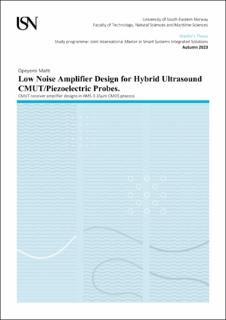Low Noise Amplifier Design for Hybrid Ultrasound CMUT/PZT Probes
Master thesis
Permanent lenke
https://hdl.handle.net/11250/3094949Utgivelsesdato
2023Metadata
Vis full innførselSamlinger
Sammendrag
This thesis focuses on the analysis and design of low-noise amplifiers (LNAs) specifically tailored for medical ultrasound imaging. The objective is to develop amplifiers that can effectively sense signals from a Capacitive Micromachined Ultrasonic Transducer (CMUT) used in the Dual-Frequency Hybrid Ultrasonic Transducer (DHUT) system. Two amplifier topologies, namely the common source (with resistive feedback) and common gate configurations, were implemented using the AMS-0.35µm CMOS process.
To facilitate the amplifier design, an existing analytical model for a collapsed CMUT array was adapted to investigate the CMUT's frequency response and determine its center frequency. The small signal model and noise characteristics were thoroughly analyzed to guide design parameter decisions, employing the gm⁄ID based design methodology for CMOS analog circuits.
The common source amplifier achieved a minimum noise figure of 4.52 dB, which increased to 6.98 dB with the inclusion of resistive feedback. The common gate amplifier achieved a minimum noise figure of 12.49 dB. Various gm⁄ID combinations for the transistors in each amplifier were explored, with a focus on noise performance. Additional performance metrics such as gain, unity gain frequency, and power consumption were evaluated for each design point.
The resistive feedback common source amplifier exhibited a low-frequency gain of 25 dB, a gain of 20 dB at the center frequency (7 MHz), and an approximate unity gain frequency of 85 MHz with a 10 pF capacitive load. The common gate amplifier featured a low-frequency gain of approximately 35 dB, a gain of 24 dB at the center frequency, and an approximate unity gain frequency of 114 MHz with the same capacitive load. Both amplifiers consumed approximately 189 µW of power.
